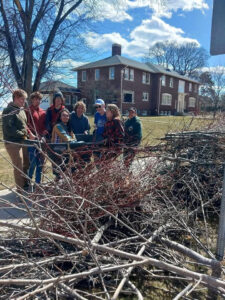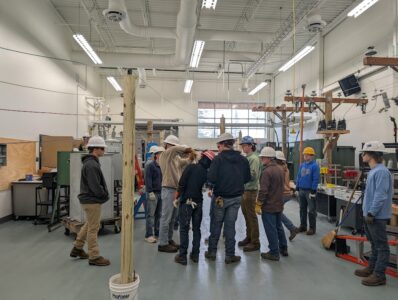Linemen-in-training discuss ACC program and ice storm

News Photo by Reagan Voetberg Students in a utility technology class at the Electrical Power Technology Center at Alpena Community College participate in a hands-on learning scenario on Tuesday.
ALPENA — In the wake of the ice storm, students in the utility technology program at Alpena Community College are witnessing firsthand the significance of their future careers as linemen and utility workers.
Roy Smith, the program’s lead instructor, said that the college offers a nine-month program for initial hands-on training and book learning to become a lineman.
Once a student graduates from that program, they will then work as a lineman apprentice for about four years to gain additional hands-on experience and book learning.
ACC also offers an advanced program for students who are specifically targeting Consumers Energy, Smith said.
Students have the third option of earning a two-year associate’s in applied science in utility technology. For that degree, they are required to take general education classes on top of their linemen courses.
Smith said that the utility technology courses are highly competitive.
“The maximum enrollment we can have in the climbing classes in any year is 60, so that’s four sections of 15 guys (or girls),” Smith said. “And that’s what causes our hold up sometimes in that we get a couple hundred-plus applications every year and can only accept 60 people to each year’s class.”
Students Isaac Hyatt and Riley Ransom are both in the standard nine-month certificate program.
“It was really exciting, and I actually got really lucky because … you know these slots fill up, and they were full for the one year but then I got a call from the head of admissions like the week before classes started, and he’s like ‘We had someone drop out, do you want the spot?'” Hyatt said.
Ransom had a similar experience.
“I’m also in the one year for the certificate, and I actually got the same call that he did, but that was for last year’s class, but I just did not have anything ready, so I actually just asked and got put on a waitlist and just came here this year,” Ransom said.
While linemen can get hired off the street, people that go through an educational program like ACC’s have a much higher chance of landing a job, Hyatt said.
Almost all linemen are required to have a Class A commercial driver’s license.
Some have already obtained their license, while others work on it while enrolled in the nine-month course.
“That’s one of the things that I think this college is set apart from all the other ones,” Ransom said. “We dig into the book work, on top of all the climbing … It really opens a bunch of doors for you.”
Not only can a graduate become a lineman, they could become a substation tech, field engineer, staker, meter calibrator, or work in fiber optic and communications, said Smith.
Ransom and Hyatt said they’d been asked a lot whether they were able to help out after the recent ice storm knocked out power lines and poles across Northeast Michigan.
“I think that would have been amazing, but there would have been no way,” Ransom said.
“Just a huge liability,” Hyatt said.
Smith explained further why it would not have been possible for students to help with ice storm damage.
“No, because the apprenticeship, and the way that things are designed within this industry, because of the dangers that are involved with doing that type of work and so on,” Smith said.
New apprentices at a power company are assigned to one journeyman, a term used interchangeably with lineman, who is responsible for that apprentice’s safety.
Since none of the students at ACC have gone through their apprenticeship yet, they do not have the level of skill needed to work in the field, even in the case of an emergency like the ice storm.
Although, Smith said, when he finished school 35 years ago, he worked under the guidance of a journeyman after three days of thunderstorms and tornadoes in his first week. The damage was not as bad as the ice storm, but he did not have the experience yet to work in the field without close supervision.
“A lot of people don’t realize how intensive it is,” Smith said.
Hyatt said that the ice storm has motivated him to keep pursuing utility technology as a career.
“A lot of people go into it for money, but there’s a lot of jobs where you can make a lot of money, but as a lineman, you can be outside … you’re going to different places to do your job everyday,” Hyatt said.
“You’re getting to serve the public,” Smith added. “When you get done with that job and you throw that cutout switch or that fuse in, and you see the lights come on, and you hear the kids, ‘Yay!’ and people waving at you off the porch, it is very rewarding when those types of things happen.”
Hyatt said the storm made him and his roommates realize just how much they take electricity for granted. For some, it’s necessary, like for people that need oxygen, Ransom added.
“You realize how much of a service you’re contributing to getting people back,” Hyatt said.
ACC will host the 2025 College Lineman Rodeo from 9 a.m. to 3 p.m. on Friday, April 25. The competition will feature teams from across the country in events based on traditional lineman tasks and skills, competing in four-member teams behind Van Lare Hall along the Thunder Bay River. The public is welcome to attend. ACC teams have competed in lineman rodeos every year since 2008, according to the ACC website.
Reagan Voetberg can be reached at 989-358-5683 or rvoetberg@TheAlpenaNews.com.





